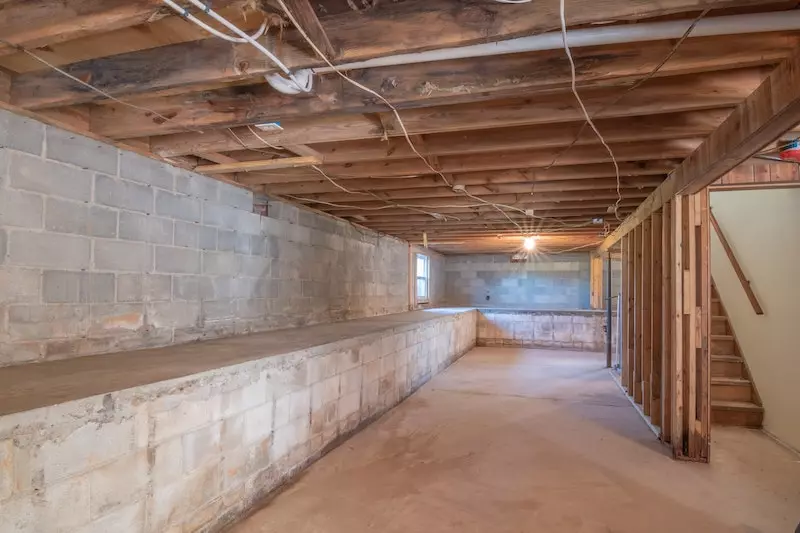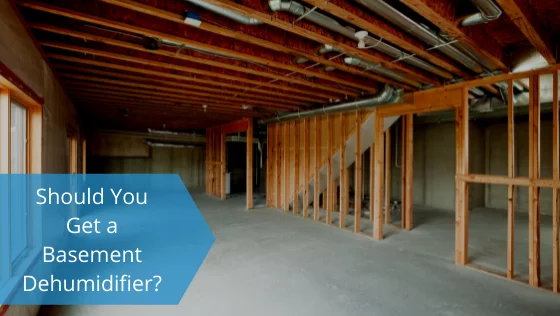Your basement is a valuable addition to your home, providing extra room and storage space at your property. Unfortunately, it’s also one of the areas of your home most prone to moisture and dampness. This can cause serious problems, especially if you are storing fragile or valuable items in your basement, or if you plan to use the area as an activity space.
Fortunately, a basement dehumidifier system provides an answer here. This system will remove much of the moisture and humidifier from the air, making for a far more pleasant environment while keeping your belongings — and your space — safe from harm. But do you really need a base humidifier system, and are there any disadvantages to this kind of solution? Find out more as we explore how to maintain the environment of your basement.
What Does a Basement Dehumidifier Do?
A basement dehumidifier removes moisture from the air in your basement space. This means your basement stays at a manageable and safe humidity level, providing a comfortable and healthy environment for people and animals, as well as a viable space for storage.
The best dehumidifier for your needs depends on the size of the basement, the equipment in the space, the windows and entry points, and any other equipment in your basement. Measure the area of your basement floor space by multiplying the length by the width. If your basement floor is not square or rectangular, divide the space up into different rectangular areas, measure these dimensions and then add them all together. You can then compare this area with the specifications on the dehumidifier unit to decide if it is suitable.
If you live in a humid climate, or if you operate a washing machine in your basement, you may need to purchase a dehumidifier with a larger capacity. If you have multiple entry points that open to the outside of the property, you may also need a system with a greater capacity.
When to Use a Basement Dehumidifier
You will only need to run your basement dehumidifier system when the humidity levels exceed safe and comfortable levels, so you probably won’t need to run it all the time. Even models that are designed to be low-cost and low-energy will still add an unnecessary expense to your bills if you are operating them around the clock.
So, when should you use your basement dehumidifier?
- When the space becomes uncomfortable — If you feel that the air is humid and close in your basement, and you do not enjoy spending time there, a dehumidifier may ease these conditions.
- When climatic conditions change in your part of the country — Locations such as Louisiana and Florida have very high humidity levels, as do northern areas such as Alaska. Changes in the climate throughout the year may cause wild variations in humidity in these places.
- During the winter — Generally, colder air is easier to saturate than warm air, so humidity is likely to feel higher during the winter months.
- When you need to store sensitive items — Some stored items may require very specific humidity levels.
- When you notice early signs of mold or mildew — If you catch the problem early enough, a dehumidifier can kill mold and mildew before it has a chance to take hold. However, if the issue is already an extensive one, you may need to actively remove it from your basement.
The Disadvantages of a Base Dehumidifier
You may not always need a dehumidifier. In fact, in some cases, this kind of system may cause problems. To help you make a decision, take a look at a few of the disadvantages of a basement dehumidifier.
- The dehumidifier may be expensive to run. If you are running your dehumidifier too often — for example, when the humidity levels are already acceptable — this may have a harmful impact on the environment.
- The unit may make humidity levels too low, which can result in medical issues such as dry and itchy skin or unproductive coughing.
- Running the unit may increase the temperature of the basement space, which may be unwelcome during the summer months.
Are Basement Dehumidifiers Permanent?
Just like with any other project in your home, you need to know what kind of solution you are dealing with — whether you are working with a temporary, portable machine or a system that will need to be permanently installed within your space.
The answer to this question depends upon which type of humidifier you choose. If you choose to have a dehumidifier installed as part of your home infrastructure, this will be a permanent solution. You will be able to uninstall it if you want, but this is going to be a big job. Alternatively, if you deploy a portable, standalone unit, this will not be a permanent humidifier system. You can easily move this unit to different locations.
The option you choose is up to you. Just remember, you do not need to run your dehumidifier all the time — in fact, it is not environmentally friendly or cost-effective to do so. You’ll only need to operate it during periods of high humidity. With this in mind, you may not need to install a permanent piece of equipment.
Recommended Humidity Levels in a Basement
The key aim of a basement dehumidifier system is to maintain a safe, comfortable, and pleasant level of humidity in your basement space. In order to achieve this, you need a target — a humidity level that is considered safe but not too dry.
The best way to eliminate mold and mildew development in your basement is to keep humidity levels above 30% but below 50% This means there is not enough moisture in the air to support the growth of mold and mildew, but the atmosphere does not feel too dry or unpleasant. You can use this as your target humidity level.
If humidity is tracking a little above the 50% point, this may not be too much of an issue. Any environment where moisture is above 80% is ideal for mold and mildew to take hold, so this is where the danger really starts to become apparent. Aim for below 50% if possible, and certainly well below 80%, but don’t worry if the levels go a little above 50% from time to time.
Remember, if you are storing high-value equipment or anything that is extra sensitive to climatic conditions, you may need to maintain very specific humidity and temperature levels. A specially-designed system may be required here.

Do You Need a Basement Humidifier?
In some cases, you may need a basement humidifier system. This is basically the opposite of a dehumidifier, adding moisture to the air rather than taking it away. You may need this equipment if:
- You live in a very dry or arid climate.
- You want to balance the humidity level after a period of dry weather.
- You have equipment or stored items that require a very specific level of humidity.
- Someone in your household has a medical condition that is exacerbated by dry conditions.
Choosing the Best Basement Dehumidifier for Your Situation
While a basement humidifier may not be necessary for all, some consumers will really need one. It all comes down to the climate in your specific location, the items and equipment you have in your basement, the medical needs of you and your family, and the configuration of your basement space.
To learn more about basement dehumidifier systems and to get a better idea of which unit is right for you, check out our handy resources page.

